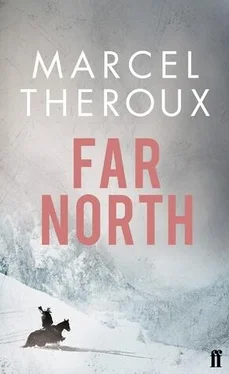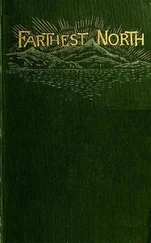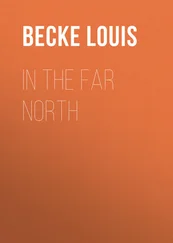MY PARENTS NEVER spoke of the past, and me, I never took much interest in it. The past had nothing to teach me. The beginning of the world and my birth seemed like the same event. For me, the world began with water dripping off wet sheets in the sunlight. I was the creator, blinking my eyes to make night and day. And I was Noah, arranging my chipped hardwood animals in the dust of the arctic summer. I taught my family language, and I was the first human to set foot in the wilderness at the bottom of our vegetable patch.
But now I know different.
I thought I was born into a young world which was aging before my eyes. But my family came here when the world was already old. I was born into the oldest world there was. It was a world like a beaten horse, limping with old injuries, and set on throwing its rider. And my parents, who claimed to love plain workmanship and the clean forthright language of the Bible, behind them was a world of memory stones, and planes, and cities of glass that they wanted to unknow.
There’s plenty of things I’d like to unknow, but you can’t fake innocence. Not knowing is one thing, pretending not to know is deception. While me and Charlo and Anna were playing in the dirt like fools that think they’ve found Eden, and the other settlers were congratulating themselves on having the foresight to land up in a perfect corner of our damaged planet, the world they left behind was unravelling. What arrogance made us think we were far enough to be safe?
*
We didn’t know it at first, when that first starving woman fell dead outside the grocery store, but it seemed like half the world was on the move.
By the time I was fourteen, our city had close to doubled in size and there were shanties on the outskirts that seemed to grow every day with new arrivals who brought stories of flood, pestilence, and war. Our city felt like the hub of a world in chaos instead of somewhere obscure and insignificant, way out on the spinning rim of a calamity we had no power to control.
Only the desperate travelled in summertime. It meant they’d given up all hope of a harvest and were travelling in the heat and dust, trying to scavenge food as they went. Some of them were settler families who had been flooded out of homesteads to the south, but most were from much further away: Russians, Uighurs, Chinese, Uzbeks, all rail-thin, with ancient, withered faces, even their little ones. Some were too sick to be helped. The things these people were fleeing made the world my parents had left seem like paradise.
In those early days, my father and the largest number of the settlers saw these people’s coming as a test of their doctrine. They welcomed the incomers like lost kin.
I remember one exhausted Uzbek family who were billeted at our house when I was nine or ten. The parents scolded their children for snatching at the food as it was set down on the table. The mother picked at her meal in a restrained, delicate way as though she was too proud to admit to her hunger.
She could speak English and she translated for the others as my mother made small talk about the life she had left. It was things I had heard a thousand times and never paid any heed to, about the rich hiding behind a wall of money, and streetlamps blocking out the starlight, and strawberries in the cooler in February, and noise, and dirt, and incivility, and I’ll never
*
The people who came at first were not of a bad kind at all. They were placid with hunger and eager to work. What was strange was how resentment got stoked up by our charity. With nothing at all, the first incomers threw themselves on our mercy. When the edge was off their hunger, they looked around and wondered about our spare rooms, and the food that was being kept by for trading and planting, and it rankled with them.
The more dangerous ones began to show up later. They were fewer in number and travelled in wintertime. That was only common sense. The winter roads made for better going, and you had summer and fall to provision yourself for the trip. They arrived in better shape. One or two had cars. Most had guns. That was common sense too, but it didn’t make them any more welcome. They tended to squat the outskirts of the city. At night, you could see their cooking fires. Many of them were deserters. They were young, and even the best were changeable and still smarting from the indignities of the battlefield.
So there we were, settlers who had forsworn the old world only to have it fetch up on our doorstep. Us on the one side, and the desperate and dangerous on the other. It was like two different species colliding: the world that had a choice, and the world that had none. The strains between us were ratcheting up in secret. And even those who noticed it, didn’t like to admit to it. The trouble lit slow, like one of those lazy damp-leaf fires in autumn.
*
The summer I was fourteen, some Russian boys were squatting a barn that belonged to a settler family called the Tumiltys. Mr Tumilty had said two of them could stay, but ten came, and they ended up in dispute over it.
One night in August, the barn went up in flames and eight of the boys were killed. They’d been drinking and cooking shashlik among the hay-bales, but a rumour went round that the fire had been set on purpose. The dead boys’ angry friends went round to Tumilty’s farm and broke his windows. When he came outside to speak with them, they roughed him up. He had a weak heart and died on the spot.
The boys lit out, but the ill-will stayed round the place. Settlers complained they felt unsafe. Incomers were spat at, and some shopkeepers refused to take the little tickets that were doled out to the poorest of them to buy food.
Families that had been friends for years fell out over the way the incomers were getting treated. People dropped away from church, or set up rival meetings. It became clear that our city was tearing itself in two.
My father as a leading man in the city was looked to as someone who ought to give guidance. He called a gathering of the heads of families in the meeting house — the same one where I later found the fingers.
So many came that the meeting had to be held outside. It was a rowdy gathering. Tumilty’s son and widow were there. Mrs Tumilty made a passionate speech, naming the murderers and asking for justice. There were plenty that sided with her. But there was another faction who felt the call for punishmp id revenge would alter the spirit of our settlement utterly. At that time we had no police, no courts, no judges, no penal code. There had been deaths before now, but no crimes of violence. This was our Cain and Abel.
Many were waiting for my father to speak. He took his time. When he finally did, he spoke against punishment. Pa was steeped in the Bible and he wanted us to be moved only by love and compassion. He pointed to the feeding of the multitudes as a sign for how we should behave.
Tumilty’s widow shouted from her place in the crowd that we didn’t have six magic loaves that could feed five thousand.
Pa tried to handle her gently, but he pointed out to her that the loaves weren’t magic. The miracle was human nature, behaving in a spirit of good will that multiplied in the act. In simple words, he said, when each of the five thousand saw the fish and bread coming out, they reached into their robes and pulled out the food they’d been keeping for themselves. ‘Fear breeds fear,’ Pa said. ‘We have to offer our guests selfless support and expect nothing in return. We have enough food. The land around us is empty and big enough to absorb all that have come and more. We have to be soft enough to yield to what’s inevitable, but strong enough to hold tight to our doctrine.’
Tumilty’s widow and son took his words very badly. It seemed my father was blaming the dead man for being ungenerous. ‘They are not people like us,’ said Tumilty’s son, Eric. ‘Give them an inch, and they take a yard. They’re laughing up their sleeves at us and think we’re fools for parting with what we’ve sweated for. They’ll pay us back all right. You’ll each get what my father got. Six feet of ground for every one of you.’
Читать дальше












